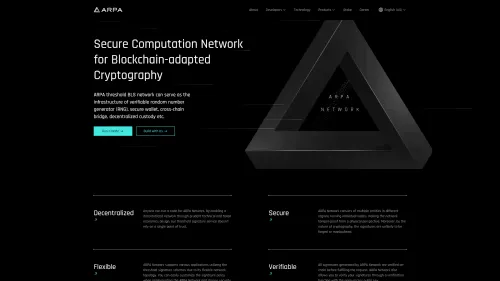ARPA (ARPA)
ARPA Network is a decentralized secure computation network designed to enhance the fairness, security, and privacy of blockchains. It serves as an essential infrastructure for various blockchain applications, including verifiable random number generation, secure wallets, cross-chain bridges, and decentralized custody across multiple blockchains. Initially known as ARPA Chain, it was established in 2018 as a privacy-preserving Multi-party Computation (MPC) network.
History of ARPA Network
ARPA Network began its journey as ARPA Chain in 2018, focusing on privacy-preserving technologies through Multi-party Computation. Over the years, the network has successfully completed more than 224,000 computation tasks. This extensive experience in MPC and cryptography has been instrumental in the development of innovative threshold BLS signature schemes (TSS-BLS), which form the backbone of the current ARPA Network.
Core technologies of ARPA Network

| Ticker | ARPA |
| Category | BNB Chain Ecosystem |
| Website | https://www.arpanetwork.io/en-US |
| @arpaofficial | |
| Telegram | arpa_community |
| Contract Addresses | |
|---|---|
| ethereum | 0xba...1a Copied! Copied! |
| binance-smart-chain | 0x6f...7e Copied! Copied! |
| polygon-pos | 0xee...26 Copied! Copied! |
Multi-party computation (MPC)
Multi-party Computation is a cornerstone of ARPA Network's technology, enabling multiple parties to jointly compute a function over their inputs while keeping those inputs private. This ensures that sensitive data remains confidential, which is crucial for applications requiring a high level of privacy.
Threshold BLS signature schemes (TSS-BLS)
TSS-BLS is another significant technological innovation of the ARPA Network. This system design allows the network to support secure and verifiable operations across its infrastructure. The threshold BLS signature enables efficient and secure validation processes, which are essential for maintaining the integrity and trustworthiness of blockchain applications.
Randcast: A key application of ARPA Network
Randcast is the first application to leverage the ARPA Network as its infrastructure. It functions as a verifiable Random Number Generator (RNG), providing a cryptographically secure and cost-efficient random source. Randcast's tamper-proof randomness is beneficial for a wide range of applications, including metaverse projects, gaming, lotteries, NFT minting, whitelisting processes, key generation, and blockchain validator task distribution.
Applications and use cases
ARPA Network's infrastructure supports numerous applications across different domains:
- Metaverse: In virtual environments, ARPA Network can enhance security and fairness through its random number generation and secure computation capabilities.
- Gaming: Game developers can utilize Randcast for fairer and more secure in-game mechanics, ensuring an equitable experience for all players.
- Lottery: The network's RNG capabilities provide a reliable method for generating random numbers in lotteries, enhancing trust and transparency.
- NFT minting and whitelisting: ARPA Network can facilitate secure and fair distribution processes for NFTs, ensuring randomized and unbiased outcomes.
- Key generation: The network's secure computation capabilities are crucial for generating cryptographic keys that are both secure and private.
- Blockchain validator task distribution: By using ARPA Network, blockchain validators can distribute tasks more securely and efficiently, enhancing the overall network performance.
